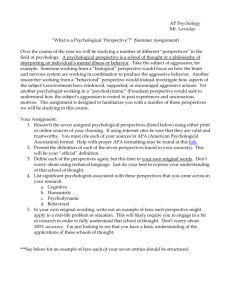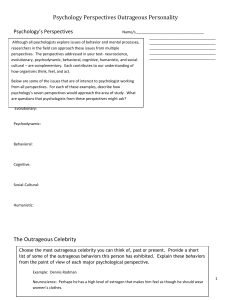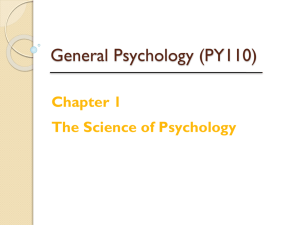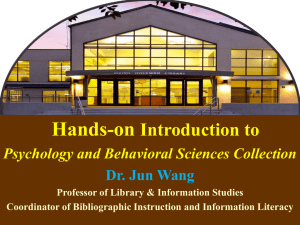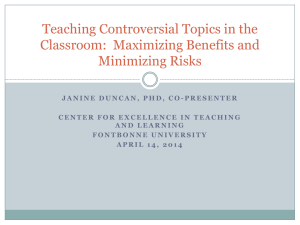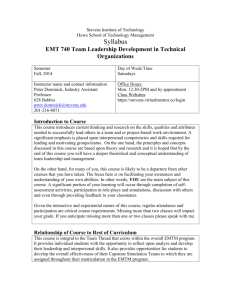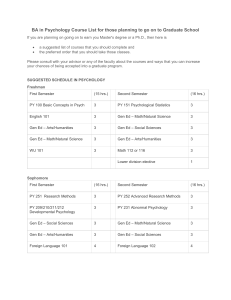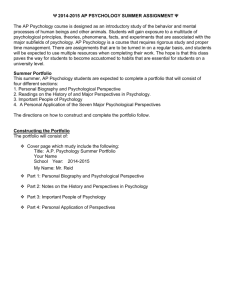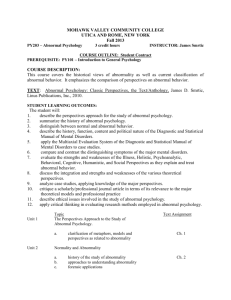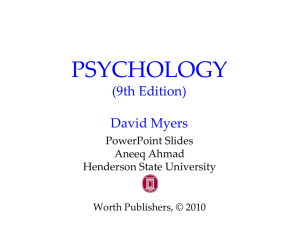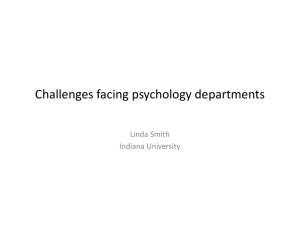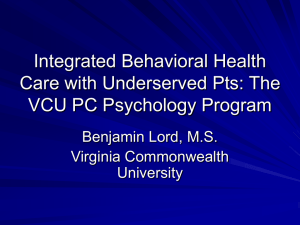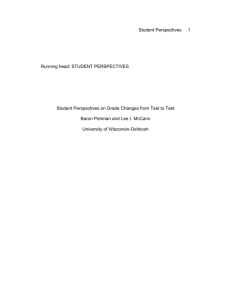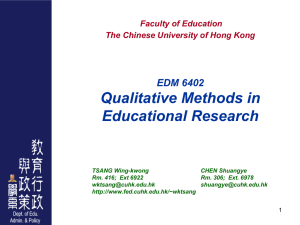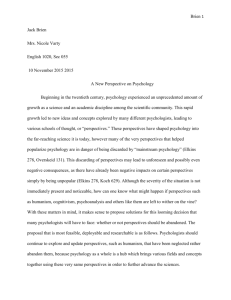Psychology`s General Education Outcome
advertisement
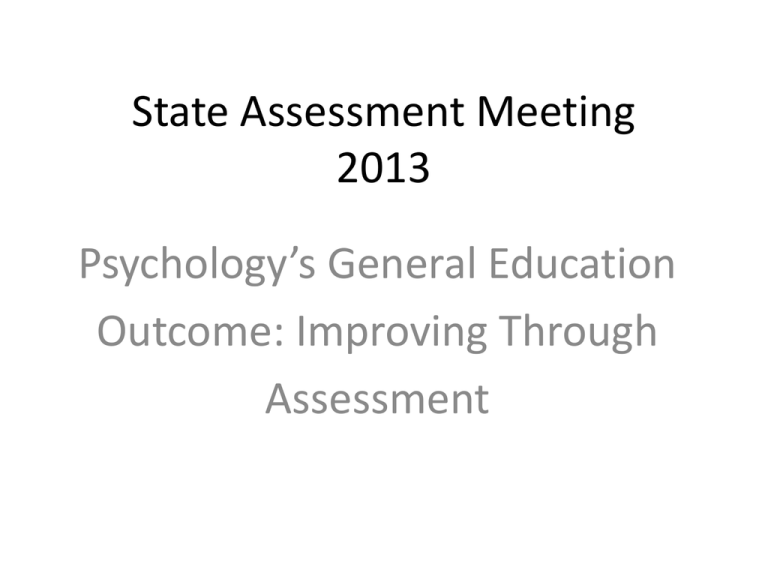
State Assessment Meeting 2013 Psychology’s General Education Outcome: Improving Through Assessment Identifying the Gen Ed Learning Outcome (GELO) Historically: Attain a global social and multicultural perspective (2005) Assigned to Social Science Gen Ed courses: Demonstrate tolerance for a wide range of global, social and cultural points of view (2007) A Measurable Outcome Describe wide range of global, social and cultural points of view and apply various perspectives to analyze human behavior (2008) Apply the scientific method to analyze human behavior from multiple perspectives and cultural viewpoints Learning Outcome Report, Fall,2008 • Psychology: • Introduction to Psychology – 312 students • Students earned an average grade of 2.89 (85.9% earned a C or better) on a 5 point scaled Assessment on the Assessment of the learning outcome of “describe a wide range of global, social and cultural points of view and apply various perspectives to analyze human behavior.” But What does it Mean? Closing the Loop – actionable data! • • • • Align Assessment with the Learning Outcome Identify strengths/weakness Come up with a plan of action Assess the effectiveness of the actions taken Align Assessment with the Learning Outcome • From – 20 m/c questions assessing course concepts • To – 20 scenario based m/c questions applying knowledge of perspectives and analyzing behavior • • • • • • DRAFT PSY2012 Learning Outcomes Fall 2007 Learning Outcomes: Students will: 1. apply the principles of the scientific method to the evaluation of research in the psychological sciences and to material presented in the media about the behavioral sciences. (Q1-4) • 2. analyze human behavior in various contexts using the neuroscience, evolution, behavioral genetics, psychodynamic, behavioral, cognitive and socio-cultural perspectives (Q5-8) • 3. evaluate human behavior using the various subfields of psychology including neuroscience, sensation, perception, states of consciousness, learning, memory, thinking and intelligence, motivation, personality, psychological disorders (Q9-17) • 4. demonstrate a tolerance for a wide range of global, social and cultural points of view. (Q18-20) Identify strengths/weakness • From external blame: – “Students can’t read” – “Advisors let students think psychology is easy” – “Students aren’t engaged or accountable” Come up with a plan of action • To what action can we take? – Adopt a textbook with accessible reading level – Recommend sample syllabi available prior to registration – Incorporate activities to engage students in learning process with accountable deadlines Assess Effectiveness of Actions taken • Compare year to year GELO (Gen Ed Learning Outcome) assessment data • Compare year to year exam scores • Compare year to year success rates • Examine relationships between newly added activities and exam scores Gen Ed Learning Outcomes 2011 2011 to 2012 Exam scores • Dr. Russell’s PSY2012 exam scores year/year Year 2011 2012 N 285 308 Mean S.D. 305.58 (76.3%) 49.05 306.07 (76.5%) 46.49 Compare Year to Year Success Rate 2011 Overall Success Rate: 175/258 = 68% 2012 Overall Success Rate: 179/243 = 70% 2011 Face to Face Success Rate : 132/173 = 76% 2012 Face to Face Success Rate 116/157 = 74% 2011 Internet Success Rate: 43/85 = 51% 2012 Internet Success Rate: 54/86 = 63% Examine Relationships Correlations between all 4 exam scores and Interactive quizzing Mastery quizzing r = .34 r = .57 Students who engaged in activities were more likely to earn higher exam grades Possible hypotheses to explain the data: • One semester’s data may be insufficient to identify real change • Adopting a more accessible text doesn’t matter if students don’t read (future action: make greater effort to link class material to the textbook). • There is a learning curve for faculty adopting new materials and strategies (future action: continue to work at linking online materials to classroom activities and assessment) • Students must access and engage in activities in order to see an effect on learning (future action: work to remove barriers to early student access; reinforce student access efforts and contact students who are not using materials to increase access). The cycle continues: • Review of spring data shows continued improvement in internet courses • Providing provisional access codes improved student performance on activities, but not overall grades • Faculty have voluntarily decided to use common exams, across instructors and formats during, Fall, 2013 term • We’re still seeking answers….. And strategies for improvement!
